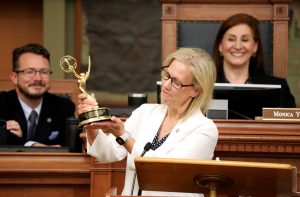
(File Photo by Kevin Mathewson, Kenosha County Eye)
Madison, Wis. – In back-to-back announcements this week, State Rep. Amanda Nedweski (R–Pleasant Prairie) unveiled two major legislative efforts—one targeting improved access to breast cancer screenings, the other aiming to overhaul Wisconsin’s sprawling regulatory code.
On Monday, Nedweski introduced “Gail’s Law,” a bipartisan bill designed to eliminate insurance coverage gaps for women undergoing follow-up breast cancer screenings. The bill mandates that insurers cover supplemental diagnostic imaging—such as ultrasounds or MRIs—for patients with dense breast tissue or abnormal mammogram results.
“Whether it is yourself, a mother or grandmother, a daughter, a neighbor, friend or co-worker—we have all felt the heartbreak that comes with hearing the words ‘breast cancer’ at one time or another,” said Nedweski. “This bill will help reduce that suffering through early detection.”
Roughly half of all women have dense breast tissue, which makes traditional mammograms less effective and increases the risk of late-stage diagnosis. Under current law, initial mammograms are covered, but follow-up screenings are not—leading some patients to face out-of-pocket costs upward of $1,000. Nedweski emphasized that the financial burden often deters women from seeking necessary care.
“Gail’s Law is not only cost-saving—it’s life-saving,” she said, noting that early detection yields a 99% survival rate and could ultimately reduce long-term treatment costs by as much as 60%.
If enacted, Wisconsin would join 28 other states with similar laws requiring insurance coverage for supplemental breast cancer screening.
Just a day later, Nedweski and fellow Republicans rolled out a sweeping regulatory reform package dubbed the “Red Tape Reset,” aimed at scaling back what they describe as a bloated and burdensome rulemaking system in state government.
The proposal includes sunset provisions requiring outdated regulations to be reviewed and automatically repealed after seven years, limits on the number of rules per scope statement to prevent bureaucratic overreach, and a “net-zero” policy mandating that any new rule be offset by the repeal of an existing one.
“Excessive regulations come with real economic consequences,” said Nedweski, who chairs the Assembly Committee on Government Operations, Accountability, and Transparency. “They slow growth, drive up costs for businesses and families, and stifle innovation—especially for small employers.”
Wisconsin is currently ranked the 13th most regulated state in the country, with over 165,000 individual restrictions on the books. Nedweski cited economic projections estimating that trimming just 10% of those rules could unlock $6.6 billion in GDP growth by 2037.
“These bills promote good governance and public engagement in a process most people never see—but that impacts their lives every day,” she said.
Both proposals signal Nedweski’s continued legislative momentum in her first term, balancing health care accessibility with her broader conservative platform of shrinking government and restoring fiscal discipline.
She represents the 32nd Assembly District, which includes portions of Kenosha, Pleasant Prairie, Lake Geneva, Salem Lakes, Twin Lakes, and other areas in southeastern Wisconsin.
.
.
.



































4 Responses
And with Governor Dipshit, nothing will happen.
Jeez at least she is trying…this is huge! How about some positivity here? You must watch too much news. Negative Nancy!!!
How about adding coverage for thermography as an option for screenings. It’s highly effective.
Won’t this just make insurance more expensive? Just like Obamacare, they frame it as “access”, and it sounds good on face value, but it just jacks up the price